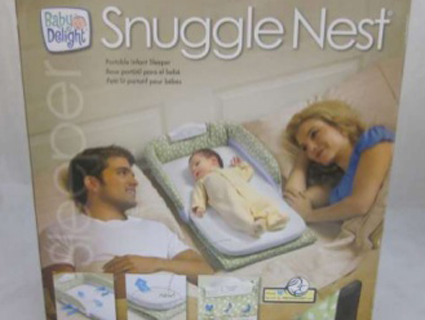
Image courtesy of CEH
UPDATE: Walmart announced Thursday evening that it will remove unlabeled items from its California stores.
The Oakland-based Center for Environmental Health announced on Thursday that it is taking legal action against a group of retailers selling products—many of them designed for infants and toddlers—that are made with a carcinogen. That includes changing pads, crib mattress pads, nap mats, and baby seats.
The chemical TDCPP, also known as chlorinated Tris, was removed from clothing for babies back in the 1970s. But it can still be found in a number of products that contain flame retardant-laced foam. Since October, California has included the chemical on its list of carcinogens and required products that carry it to bear a warning label. (California is generally the most aggressive in forcing companies to remove or at least label harmful chemicals, and since manufacturers only tend to make one model of their product, the California labels usually appear everywhere in the US.)
But despite the fact that there have been concerns about this chemical for 40 years, it’s still showing up in products at major retailers in California. CEH had products purchased at Target, Babies R Us, Walmart, and Kmart tested, and found the chemical in many products that weren’t labeled as containing it.
The CEH study found the chemical in products like the Sweet Beginnings Bassinet Pad, Dexbaby Safety Changing Pad, Peerless Plastics KinderMat, Baby Delight Snuggle Nest Portable Infact Sleeper, and the Nap Nanny Portable Infant Recliner (which the Consumer Product Safety Commission has already filed a complaint against, after five infants died while using the product), among others.
CEH has issued legal notices to the companies selling these products, asking them to recall products sold since the new labeling rule was put in place at the end of October, and to either remove the chemical from new products or label them appropriately if they include the chemical. If the legal notice is not addressed in 60 days, the group has signaled it will move ahead with a lawsuit.
A spokeswoman for Target told the San Francisco Chronicle that the company “is committed to abiding by state and federal laws and regulations, and we expect our vendors to do the same.”












